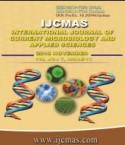


 National Academy of Agricultural Sciences (NAAS)
National Academy of Agricultural Sciences (NAAS)

|
PRINT ISSN : 2319-7692
Online ISSN : 2319-7706 Issues : 12 per year Publisher : Excellent Publishers Email : editorijcmas@gmail.com / submit@ijcmas.com Editor-in-chief: Dr.M.Prakash Index Copernicus ICV 2018: 95.39 NAAS RATING 2020: 5.38 |
Groundwater is an important source for irrigation in large tracks of India. This source has been considered as infinite and used indiscriminately without any disregard to recharge prospects. Reducing the over exploitation of ground water and its optimal utilization for irrigation is the need of the hour especially in low rainfall areas. In order to address this problem, Andhra Pradesh Government has started a project on Andhra Pradesh Draught Adaptation Initiative (APDAI) in the year 2012 in which water has to be shared by Borewell owners (BWO) and Non borewell owners (NBWO) by pooling the bore wells and irrigating through micro irrigation systems. The present study was undertaken for ground water sharing groups from the three mandals (cluster of villages) of Ananthapur district in Andhra Pradesh. The main objective of the present study was to assess water use efficiency and evaluation of overall impact of the Community Based Sprinkler Irrigation system CBSIS in three mandals viz. Garladinne, Nallamada and Goothy in poverty alleviating of the participants in comparison to before CBSIS. The study recorded an improvement in WUE under critical irrigation (CI) from 0.35 to 2.0 kg (ha-mm)-1 in Yerraguntla, 0.32 to 2.46 kg (ha-mm)-1 in Edulavanka and 0.26 to 2.02 kg (ha-mm)-1 T-Kothapally. It was also observed that there were remarkable changes in the livelihood, cultivated area and crop production under rainfed conditions with critical irrigation. Further the study recommended that the revised operating schedules can bring more area under irrigation with qualitative and quantitative improvement of the produce during kharif and rabi seasons. The results provide the insight for the adaptation of CBSIS to encounter the drought situation as a group.
 |
 |
 |
 |
 |